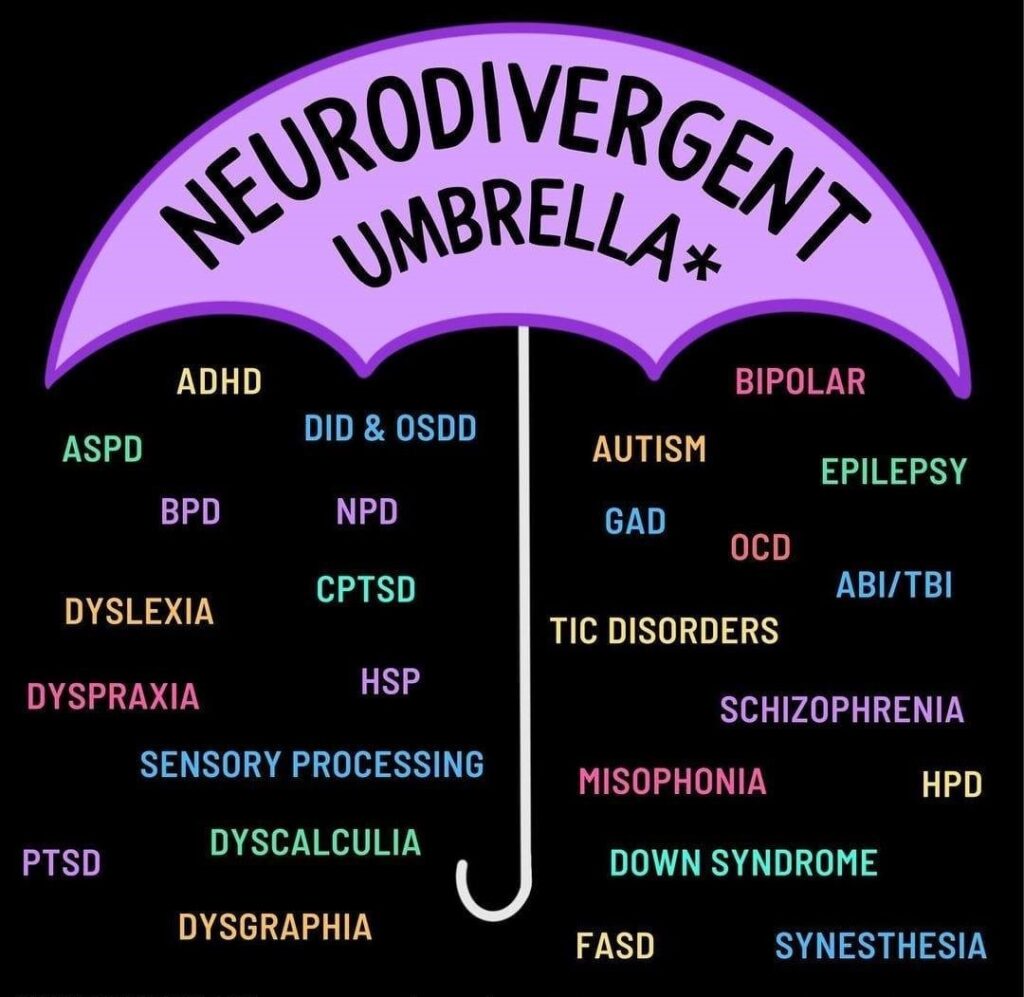Understanding Neurodiversity
Do you identify as someone unique & sensitive, or feel that you
are different from other people?

Our world is primarily designed for people with typical ways of thinking, which often makes it a difficult fit for the smaller population
of neurodivergent individuals. If life were a video game, being neurodivergent would be like playing on hard mode while most others are playing on regular mode. Because your challenges are different from theirs, they often don’t understand why you’re struggling.
Since many people can’t see your struggles, they may label you as overly sensitive, dramatic, dishonest, lazy, rude, or difficult – or even deny that you face extra challenges at all. This lack of understanding adds more stress to your life and can leave you feeling invalidated and depressed.
Not everyone understands that Autism, ADHD, and other forms of neurodivergence encompass a broad spectrum of people who make valuable contributions to society. Popular portrayals, like the movie Rain Man, have heavily shaped public perception, often leading to the misconception that these neurotypes are synonymous with intellectual disability. In reality, Autism and ADHD are not the same as intellectual disability. In fact, many neurodivergent individuals often have above-average IQs and spend much of their lives masking their traits to be accepted, often at
a significant personal cost.
Only in the past decade have doctors and psychologists begun to recognize that a much larger percentage of the population is neurodivergent than previously believed. Research also shows that many neurodivergent individuals often have above-average IQs along with unique talents and abilities. Unfortunately, people in the Millennial, Gen X, and Baby Boomer generations rarely received any screening for neurodivergence while growing up.
What Does It Mean to Be Neurodivergent?
Neurodivergent is the term used for when someone’s brain processes information, learns, and behaves differently from what is considered “typical.”
Formerly considered a problem or abnormality, scientists now understand that neurodivergence contributes to humanity1 and isn’t inherently an issue for the individual, but becomes a disability in an ableist and inaccessible society.2
Neurodivergent describes people whose brains and nervous systems function in a way that is different than usual. These individuals frequently identify as highly sensitive people, or as having autism, ADHD, asperger’s, AuDHD, PTSD, OCD, BPD, depression, anxiety disorder, panic disorder, agoraphobia, bipolar disorder, sensory processing disorder, dyslexia, dyscalculia, dyspraxia, etc.

Understanding Neurodiversity
Neurodiversity is the concept that there are various ways in which people’s brains process and function. Rather than thinking there is something wrong or problematic when some people don’t operate similarly to others, neurodiversity embraces all differences.
The concept of neurodiversity recognizes that brain function and behavioural traits are simply indicators of the diversity of the human population.
The concept of neurodiversity also seeks to frame these differences as ones that are not inherently “bad” or problematic; instead, it treats them neutrally and highlights how neurodivergence is beneficial and should be celebrated.3
For example, while neurodivergent individuals commonly struggle with time management, external stimuli, and executive functioning, they frequently demonstrate higher-than-normal levels of passion, drive, and creativity.4

Neurodiversity can be divided into two categories:
Neurotypical and Neurodivergent…
Neurotypical
Neurotypical is a descriptor that refers to someone with brain functions, behaviours, and processing considered standard or typical.
Neurotypical people usually do not know their brain type because the subject has probably never been mentioned. These people typically reach all their developmental and behavioural milestones at the same age, which is standard for most people.
Once grown, they generally move through life without wondering if their brains function the same way as others.
Neurodivergent
Neurodivergent is an adjective describing people whose brains function differently in one or more ways than is considered standard normal. There are many ways neurodivergence can manifest, ranging from very mild forms that most people would never notice to more pronounced forms that lead to a person behaving very differently than is common.
The neurodivergent brain can have multiple causes, but genetics and environment are believed to play significant roles.5 Ultimately, neurodivergence results from humanity’s incredible ability to survive and thrive despite obstacles and unfavourable environments.
Most neurodivergent individuals have ancestors who evolved to think in ways that people with typical brains do not.6

The Value in Being Neurodivergent
There is value in seeing the world from a different perspective.7 Atypical cognition increases the survival rate for individuals, as well as for groups. A highly sensitive and vigilant person in a tribe helps to protect the other members from unforeseen danger and attacks.
Neurodivergent individuals possess a range of beneficial abilities that enable them to think innovatively and engage in unique activities and complex tasks. Still, they also commonly have difficulty remembering or feeling motivated to take care of mundane but necessary responsibilities such as grocery shopping, paying bills on time, making medical appointments, cleaning, and doing other chores. Neurotypicals seem to find completing necessary chores easier, yet they also have weaknesses. Instead of focusing on deficits, highlighting people’s strengths benefits everyone in society.8
Children who are autistic have higher rates of experiencing long-term emotional and physical abuse.9 Neurodivergent adults exhibit a range of abilities that may be genetic, related to their experiences growing up in chaotic environments, or a combination of both. These abilities may include hypervigilance, hyperfocus, increased alertness, enhanced sensory perception, pattern recognition, synesthesia, high creativity, artistic ability,10 high energy levels, resilience, hyper-empathy, advanced problem-solving, nonlinear thinking, more significant risk tolerance, courage, increased self-awareness, spontaneity, and more.
Differences in human cognition have led to numerous inventions and innovations throughout history. Unfortunately, though, many in society still view any variation from the norm as a ‘disorder’ or illness and do not have a good understanding of neurodiversity.11 Neurodivergent individuals face challenges because society is ableist and is designed exclusively for neurotypicals instead of for all people.
Happy Soul Path views neurodiversity through an empowerment lens. We focus on the strengths of being on the spectrum while working to minimize the struggles. If the right conditions are met, neurodivergent individuals can be highly creative and innovative leaders in society.

There are many types of neurodivergence. Two popular types are Autism and ADHD.
ADHD and Autism 12
People with ADHD tend to have broader, varied interests and struggle with boredom and routine. People with Autism tend to have more narrow interests and engage in repetitive behaviours and strict routines. Both types of neurodivergence are not conditions that need to be “fixed” or “cured.” Instead, understanding how neurodivergent brains function and recognizing their strengths can help individuals comprehend their characteristics and thrive.
The traits of autism and ADHD can overlap,13 but there are also some key differences. Both conditions can cause social difficulties, but typically, people with Autism have more significant problems in this area. They have trouble understanding social cues and may not enjoy socializing; they can become easily overstimulated and often prefer to be alone.
People with ADHD may be more likely to seek out social interaction, but then have difficulty sustaining relationships due to their impulsivity and hyperactivity.
ADHD and Autism share common characteristics, including the ability to hyperfocus on special interests, inattention, atypical movement (such as fidgeting or stimming behaviours), social difficulties, sensory sensitivities, differences in learning style, and executive functioning.14 More recently, it has been discovered that neurodivergence is frequently associated with higher intelligence and creativity.15
AuDHD
It’s also crucial to be aware that people can have Autism and ADHD co-morbidly. This is referred to as AuDHD. Due to symptom overlap,16 individuals with AuDHD might have more difficulty receiving an accurate diagnosis.
A unique combination of symptoms that does not neatly fit into one diagnostic criterion may be overlooked or misunderstood, and most psychologists only assess one diagnosis at a time.
If you have one diagnosis, requesting testing for the other may be beneficial if you feel that your existing diagnosis does not fully describe your symptoms or experience.

Some Examples of Autistic Traits
- May have difficulty focusing on non-preferred activities but hyper-focus on activities of interest.
- May struggle to pick up on social cues, verbal communication, and auditory processing.
- May craft specific routines and might experience anxiety or distress if the routine changes.
- May pay attention to complex details, recognize patterns,17 have excellent memories, have an advanced ability to picture three-dimensional objects, easily solve complex mathematical calculations mentally, and have “specialty” skills.
- May display higher-than-average levels of creativity and innovative thinking.18
Some Examples of ADHD Traits
- May have difficulty focusing on non-preferred activities but hyper-focus on activities of interest.
- May have difficulty “filtering” what thoughts they want to share. They might interrupt frequently or enter conversations impulsively.
- May thrive with a consistent routine but struggle to follow one due to disorganization, forgetfulness, and being easily distracted.
- May have higher than average levels of creativity,19 empathy, spontaneity, courage, innovative thinking, and “specialty” skills.
- May be very energetic and “fun” 20
Post-Traumatic Stress Disorder (PTSD)
Existing as someone who is neurodivergent in a world created for neurotypical people is incredibly stressful,20 especially for those who are undiagnosed and blame their differences on character flaws.
Masking, or trying to behave in a neurotypical way when this does not come naturally, takes a lot of energy, effort, and causes much anxiety.21 In addition, neurodivergent people are at higher risk for bullying, abuse, and exploitation than neurotypical people.22 Because of this, a high percentage of the neurodivergent population has a history of trauma.23
There is an overlap between neurodivergent presentation and trauma symptoms, which may be due in part to the high number of people on the spectrum who also have a history of being abused.24 This can lead to neurodivergent people being diagnosed by doctors or psychologists with post-traumatic stress disorder, anxiety disorder, panic disorder, bipolar disorder, agoraphobia, or OCD, and having their behaviours attributed to trauma rather than to their neurodivergent status.25
Additionally, it is crucial to understand that trauma can rewire the brain. So, people who were born neurotypical but who have suffered through enough trauma can develop post-traumatic stress disorder, which causes them to become neurodivergent.

Could you be Neurodivergent?
If you have been diagnosed with any of the conditions mentioned above, it’s possible you could be neurodivergent. Suppose you have never been diagnosed but resonate strongly with the descriptors for one or more types of neurodivergence. If possible, you should seek a psychologist’s official diagnosis, which can help alleviate and mitigate potential risks.26 Additionally, you can discover more about neurodivergence by learning about people’s lived experiences.27
Whether you seek a formal diagnosis or not, Happy Soul Path honours self-diagnosis. Self-diagnosis is a valid form of identification and is the only accessible diagnostic avenue for many people at this time.
While neurodivergence is common, many individuals only realize they are neurodivergent once they are far into adulthood. In the past, only people with specific traits were thought to be on the spectrum; therefore, although neurodivergence is common, many individuals only realize they have a differently wired brain once they reach middle age or older.28
Only in the last few years have psychologists and doctors realized how prevalent neurodivergence is. Society is lagging in awareness, and most people have yet to learn that many neurodivergent adults hold influential positions of power and play essential roles in society, such as engineers, lawyers, doctors, professors, editors, and accountants.
There are far fewer females than males who are diagnosed with Autism.29 Girls and women with Autism are often undiagnosed, misdiagnosed, or only receive an autism diagnosis when they are well into adulthood. The DSM-5 currently focuses on autistic traits that males more commonly present with. Psychologists have only recently realized that females with Autism are better at masking their neurodivergent traits.30
Many individuals are currently undiagnosed and struggling to understand their feelings, thoughts, and behaviours. They might attribute their neurodivergent characteristics to anxiety or depression, which can appear in similar ways, but they also might believe they have major character flaws. This can lead to a lack of self-confidence, feelings of shame, and poor self-esteem.31
For many adults, discovering they have Autism, ADHD, or another form of neurodivergence is a positive experience as it helps explain things they didn’t understand about themselves previously.32 It allows them to recognize their strengths, the reasons for many of their problems, and, importantly, that their personality traits are due to differences in how their brain processes and not because they have failed in any way.
If you think you may be neurodivergent, you can learn to love who you are and live a happier life. Let’s schedule a time to connect.
What I will give you…
A confidential, nonjudgmental, and nurturing space for neurodivergent self-exploration.
Guidance for overcoming relationship challenges and any issues obstructing your path.
Caring support while you develop skills to help you feel confident and succeed at your goals.
Gaining a deeper understanding of how you function and how to work with yourself effectively will enhance your overall quality of life.

Who can benefit from neurodivergent counselling & coaching?
- Anyone who identifies as neurodivergent, highly sensitive, or empathic
- Anyone who feels that they are “wired differently” than most other people
Whether you’re experiencing an inability to accomplish your goals, having difficulty identifying what are the next best steps to take, struggling in one or more of your relationships or dealing with challenges related to 2SLGBTQ+, friendship, dating, marriage, infertility, parenting, divorce, or relocation; neurodivergent counselling will give you a safe, confidential and understanding space to focus on yourself and help you accomplish your goals.

The Future of Neurodivergence
As humanity evolves, so does our understanding of neurodivergence.33 Gone are the days when professionals viewed neurotypes such as Autism simply as illnesses needing a cure. Instead, there’s a profound shift towards recognizing that neurodivergent individuals make unique contributions to the world and are valuable members of society.
In tandem with this cultural evolution, special education is also progressing, with approaches centred around how people with assorted neurodivergent tendencies learn best.34 The traditional educational approach of forcing learners to fit into the environment is evolving to adapting the environment to maximize learning for each student.
What began as Autism advocacy has evolved into a broader movement encompassing all forms of neurodiversity. From ADHD to dyslexia and beyond, there is a growing acknowledgment that diverse brain functions are not only expected but also essential for societal progress.
Central to this paradigm shift is the acceptance and understanding that neurological differences are natural variations in human cognition. By embracing neurodiversity, we foster an environment where all individuals have the opportunity to thrive and flourish.35
Acknowledging and accommodating neurodivergent individuals creates an inclusive society where everyone can thrive. From workplace adjustments to educational accommodations, even small changes can significantly impact the lives of people on the autism spectrum.36
The future of neurodivergence is one of acceptance, understanding, and accommodation. By embracing neurodiversity, we unlock the full potential of every individual, creating a society that celebrates differences rather than stigmatizing them.37
As humanity continues to evolve, we will witness a more inclusive future where neurodivergent people will thrive and have greater opportunities to contribute their unique perspectives and talents to the world.

A hero is an individual who finds the strength to persevere and endure despite overwhelming obstacles.
Footnotes
- https://pubmed.ncbi.nlm.nih.gov/36880441/ ↩︎
- https://eric.ed.gov/?q=autism&pg=4&id=EJ1389867 ↩︎
- https://pubmed.ncbi.nlm.nih.gov/34088226/ ↩︎
- https://pubmed.ncbi.nlm.nih.gov/20375530/ ↩︎
- https://www.tandfonline.com/doi/full/10.31887/DCNS.2012.14.3/pchaste ↩︎
- https://pubmed.ncbi.nlm.nih.gov/28260791/ ↩︎
- https://pubmed.ncbi.nlm.nih.gov/36639858/ ↩︎
- https://pubmed.ncbi.nlm.nih.gov/32413984/ ↩︎
- https://pubmed.ncbi.nlm.nih.gov/35018722/ ↩︎
- https://pubmed.ncbi.nlm.nih.gov/16344297/ ↩︎
- https://pubmed.ncbi.nlm.nih.gov/36802826/ ↩︎
- https://www.scienceopen.com/document?vid=c9e3e00c-6a91-4f04-ac2d-c538c924185f ↩︎
- https://pubmed.ncbi.nlm.nih.gov/22851255/ ↩︎
- https://pubmed.ncbi.nlm.nih.gov/33515417/ ↩︎
- https://pubmed.ncbi.nlm.nih.gov/32757622/ ↩︎
- https://eric.ed.gov/?q=autism&id=EJ1407409 ↩︎
- https://pubmed.ncbi.nlm.nih.gov/19528021/ ↩︎
- https://pubmed.ncbi.nlm.nih.gov/31183666/ ↩︎
- https://journals.sagepub.com/doi/full/10.1177/10870547211060547 ↩︎
- https://eric.ed.gov/?q=adhd+energy&id=EJ580345 ↩︎
- https://eric.ed.gov/?q=autism&pg=2&id=EJ1413722 ↩︎
- https://pubmed.ncbi.nlm.nih.gov/38156503/ ↩︎
- https://eric.ed.gov/?q=autism+bullying&id=ED636538 ↩︎
- https://pubmed.ncbi.nlm.nih.gov/29206686/ ↩︎
- https://journals.sagepub.com/doi/10.1177/108705470400800102 ↩︎
- https://pubmed.ncbi.nlm.nih.gov/15909410/ ↩︎
- https://pubmed.ncbi.nlm.nih.gov/37341291/ ↩︎
- https://www.amazon.com/Wired-Differently-Neurodivergent-People-Should/dp/1787758427/ref=sr_1_1?crid=3L5AOXPCAS9HE&dib=eyJ2IjoiMSJ9.VD0ln-EKWbwhca8MBzo2ZSQvisGVHNkKteTZSdD1D4yUELAcriuRj6HcFn6RZNdNLJ2uKG1gHKVFIdh0PfI1_PkuFqk3YMGw2rR41LFUHaujWHnNAVv3Js0NuwBh0QjZeA6eRSpbtACYlM057KnCuhkGHm76L9bMR4rxu9eRhusst2Dza5LtK-lVnq7aw-PFi4qQpqoTdFrK2hjACxa18ow6Hz8612e-cGhUxOT1Uzk.fM4xEKH2i6bn937KE94M7n3GYBF4ENWTDtKPsmpuO9Y&dib_tag=se&keywords=autobiography+neurodivergent&qid=1713199653&sprefix=autobiography+neurodivergent%2Caps%2C143&sr=8-1 ↩︎
- https://pubmed.ncbi.nlm.nih.gov/12541002/ ↩︎
- https://eric.ed.gov/?q=autism&id=EJ1393098 ↩︎
- https://pubmed.ncbi.nlm.nih.gov/31760407/ ↩︎
- https://eric.ed.gov/?q=autism+late+diagnosis&id=EJ1238020 ↩︎
- https://eric.ed.gov/?q=autism+late+diagnosis&id=EJ1347007 ↩︎
- https://pubmed.ncbi.nlm.nih.gov/27053182/ ↩︎
- https://doaj.org/article/b90de3a9e36f4ce38d609eedb0dc0275 ↩︎
- https://eric.ed.gov/?q=autism&id=EJ1372705 ↩︎
- https://bmcpsychology.biomedcentral.com/articles/10.1186/s40359-023-01192-5 ↩︎
- https://pubmed.ncbi.nlm.nih.gov/19528032/ ↩︎